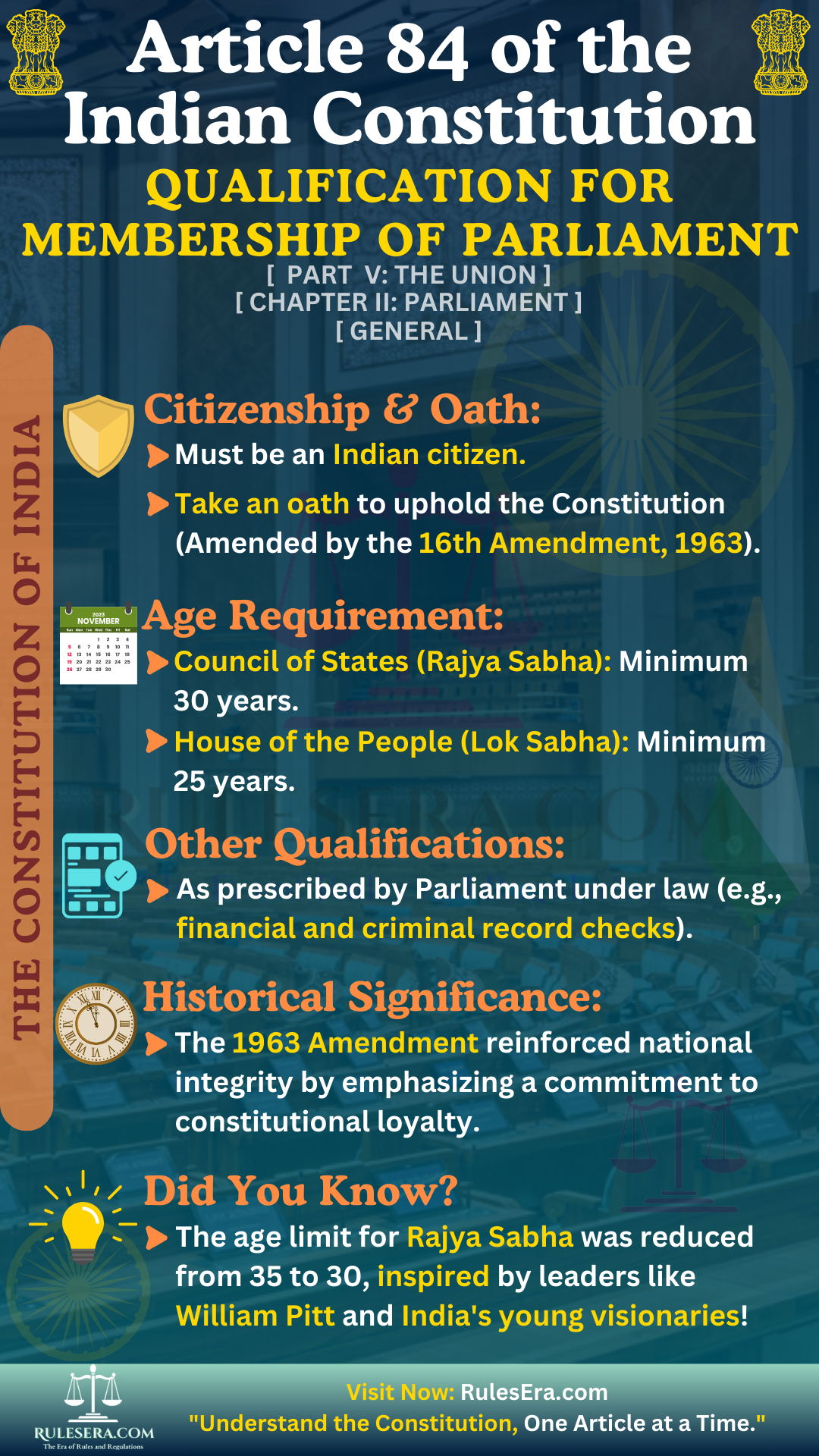Part V: The Union
Chapter II: Parliament
Article 84: Qualification for Membership of Parliament

--- Original Article ---
A person shall not be qualified to be chosen to fill a seat in Parliament unless he—
- (a) is a citizen of India, and makes and subscribes before some person authorised in that behalf by the Election Commission an oath or affirmation according to the form set out for the purpose in the Third Schedule;
- (b) is, in the case of a seat in the Council of States, not less than thirty years of age and, in the case of a seat in the House of the People, not less than twenty-five years of age; and
- (c) possesses such other qualifications as may be prescribed in that behalf by or under any law made by Parliament.
Amendment: Substituted by the Constitution (Sixteenth Amendment) Act, 1963, s. 3, for cl. (a) (w.e.f. 5-10-1963).
Explanations
Article 84 outlines the essential qualifications required for an individual to be eligible for membership in either house of the Indian Parliament. This article ensures that those holding parliamentary office meet certain standards of citizenship, age, and other qualifications as prescribed by law.
Clause-by-Clause Explanation
Clause (a): Citizenship and Oath
Originally, Clause (a) required a member of Parliament to be a citizen of India. Following the Sixteenth Amendment in 1963, it was amended to mandate that the individual not only be an Indian citizen but also subscribe to an oath of allegiance to the Constitution before an authorized person designated by the Election Commission. This emphasizes the importance of loyalty and commitment to the nation and its values.
Amendment: Sixteenth Amendment Act, 1963, added the requirement for an oath or affirmation, reinforcing the commitment to uphold the Constitution and the rule of law.
Clause (b): Minimum Age Requirements
For a seat in the Council of States (Rajya Sabha), a candidate must be at least 30 years old, reflecting the upper house's role in providing experienced insight. For the House of the People (Lok Sabha), the minimum age is 25, allowing relatively younger members to participate in shaping the legislative agenda and representing the populace. This age differentiation underscores the roles and expectations of each parliamentary house.
Clause (c): Additional Qualifications by Law
Parliament has the authority to establish further qualifications through legislation. These qualifications may include requirements related to criminal records, financial solvency, and other aspects essential for a candidate’s suitability for public office. By reserving this power, the Constitution provides flexibility for Parliament to adapt the eligibility criteria to contemporary needs.
Real-Life Example
- In cases where candidates have been disqualified for lacking essential qualifications, such as holding citizenship of another country, Article 84 has served as the constitutional foundation. For instance, politicians discovered holding foreign citizenship have been disqualified under this article, demonstrating its role in preserving the integrity of the Indian parliamentary system.
Historical Significance
The addition of the oath requirement through the Sixteenth Amendment followed significant political events, reflecting a shift toward emphasizing constitutional loyalty. This period marked heightened concerns about national integrity and the commitment of public officials to uphold constitutional values.
Legislative History
Article 84 of the Indian Constitution was initially introduced as Article 67A in the Draft Constitution. This provision was formally incorporated into the Constitution on May 18, 1949.